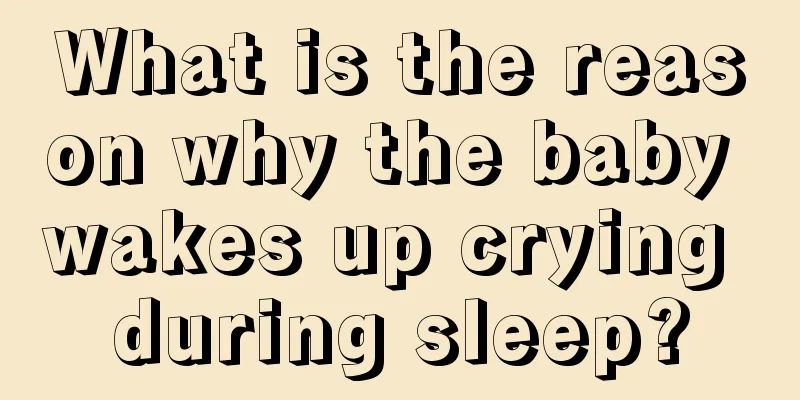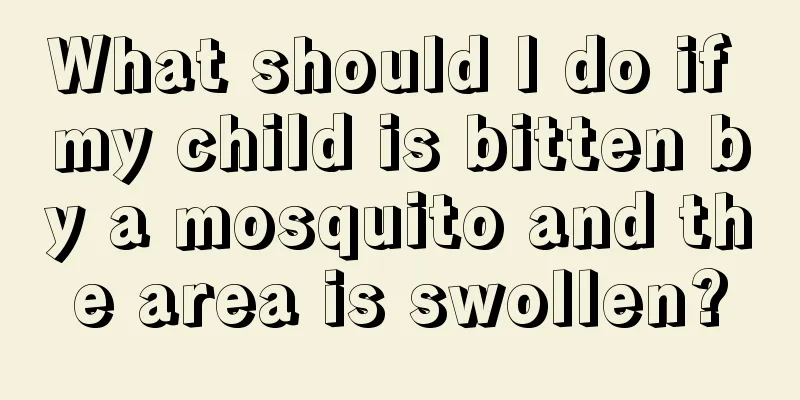What should I do if my baby catches a cold and has diarrhea? These are the solutions!

|
As we all know, young babies have very weak resistance, so if the baby catches a cold, it is easy to have symptoms of cold and cough. Catching a cold can also easily lead to diarrhea. At this time, parents must keep the baby warm and can adjust their diet reasonably. If medication is required, be sure to follow the guidance of the pediatrician. First, what should I do if my baby gets cold and has diarrhea? Generally, babies with cold and diarrhea can be easily relieved with proper care. During the illness, give your baby some Mommy Love, which can increase the beneficial bacteria in the intestines, relieve diarrhea, and improve the intestinal environment. Babies love the sweet taste, so don't worry about the bitter taste of the medicine causing pain to your baby. If the medicine cannot relieve the baby's condition, you need to take the baby's poop to the hospital for testing, and ask the doctor to prescribe the right medicine. Note that the baby's poop sample cannot be collected from diapers and cannot be mixed with other substances or urine. It is best for the baby to defecate directly, wrap it in plastic wrap, and send it to the hospital for testing within half an hour. This will be the most true result, otherwise it will affect the test results. When the baby has diarrhea, you should give the baby some food that is easier to digest. If the baby is breastfed, he only needs to eat breast milk. For the baby who is mixed-fed, feed more breast milk and less milk powder as much as possible. Milk powder is actually a food that is not easy to digest. Babies in the complementary food stage should mainly eat porridge and soft noodles, and cannot eat greasy and irritating food. Some parents think that diarrhea will be cured by an empty stomach, and the more they eat, the more diarrhea they will have. This view is wrong. Normal diet is still necessary during diarrhea, otherwise the baby's physical strength will be reduced, and he or she will be prone to coma and shock. There are some little tricks that can help stop diarrhea, for example: scorched rice soup and applesauce have astringent, antidiarrheal and absorbent effects. Second, why does the baby get diarrhea due to cold? Diarrhea is a disease caused by many reasons, one of which is gastrointestinal hypermotility. Before the water is completely absorbed, the food is discharged to the next process. The food stays in the gastrointestinal tract for too short a time and has too short a contact time with the digestive tract. This is the reason why your stomach catches a cold. Why does a cold stomach cause gastrointestinal hypermotility? This is related to the characteristics of the smooth muscle of the digestive tract. Compared with skeletal muscle and cardiac muscle, one characteristic of gastrointestinal smooth muscle is that it is very sensitive to temperature changes and chemical stimulation. Even a slight change in temperature may cause a reaction, resulting in gastrointestinal motility disorders and intestinal spasms. And it's not just catching a cold, some babies may also suffer from diarrhea due to drinking cold drinks. Mothers should observe carefully. If they find that their baby has diarrhea many times after catching a cold, and has diarrhea every time he catches a cold, they should pay attention that the diarrhea is not necessarily caused by a single reason. It may be combined with other reasons such as gastroenteritis. The baby should be taken to the hospital for treatment. Third, the main symptoms of baby diarrhea are: 1. Mild diarrhea: 5-6 bowel movements a day, or even more than 10 times. The stool is egg-drop soup-like or watery, yellow or yellow-green in color, with small white pieces. There may be low fever and regurgitation of milk. The patient's spirit and appetite are good or slightly decreased. The patient has no weight gain or has slightly decreased weight and is not dehydrated. 2. Moderate diarrhea: 10 bowel movements a day, loose watery stools, sour and smelly, and possible moderate fever. 3. Severe diarrhea: more than 10 bowel movements a day, watery stools, yellow color, vomiting, fever, oliguria, poor appetite, weight loss, rapid onset of dehydration and acidosis, hypokalemia, hypocalcemia, hypomagnesemia, etc. 4. Some babies may experience obvious dehydration, acidosis, and electrolyte imbalance, such as low potassium or low magnesium. |
<<: What should children eat when they have sore throat? Introducing the correct way to eat it!
>>: What are the symptoms of a wheezing cough in children?
Recommend
Spring children's diet
Children's diet must be arranged reasonably, ...
What to do if your newborn baby hiccups
Nowadays, people are living affluently. Many chil...
How does acrodermatitis develop in children?
If a child suddenly develops redness and swelling...
What are the dangers of green stools in babies?
The baby's health is a matter of great concer...
What to do if your one and a half year old baby is too thin
We all know that babies need to supplement nutrit...
When is the best time to treat neonatal dacryocystitis?
Neonatal dacryocystitis is a common disease in in...
Diet therapy for tracheitis in children
Tracheitis in children mostly occurs secondary to...
What is the normal sleep time for newborns?
Once a child is born, many parents are very conce...
Young parents, please remember this recipe for your baby’s fever!
Nowadays, many young people are raising their chi...
Causes of gastroenteritis in children
We know that children's organs are not fully ...
What to do if your child has a low-grade fever and convulsions
Babies have weak body resistance and are therefor...
What should I do if a 13-year-old boy has acne on his face?
Acne is a phenomenon that people are very familia...
What to do if your baby is born with low blood sugar
Maybe you think that hypoglycemia only occurs in ...
Why does a child's head sweat?
In life, sweating is actually a very normal physi...
Reasons for children sweating while sleeping
Children sweating while sleeping is a problem tha...









